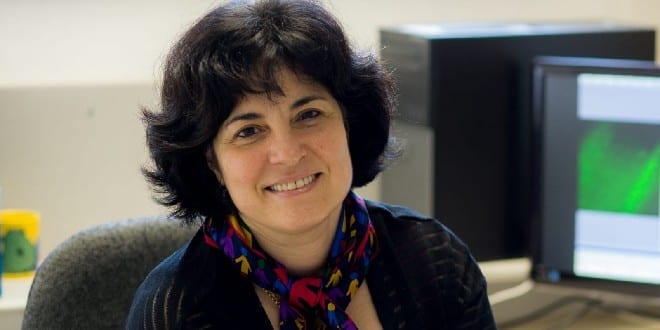In 1990, Prof. Mary-Claire King — the American Cancer Society Professor of the Department of Genome Sciences and of Medical Genetics in the Department of Medicine at the University of Washington and a good friend of Israel – made a pathfinding discovery after accomplishing two other very-different ones — that humans and chimpanzees are 99% genetically identical; and applying genomic sequencing to identify children who had been stolen from their families and adopted illegally under the military dictatorship during the Dirty War between1976 and 1983/
Her third breakthrough was her discovery of a marker on a single gene on chromosome 17 that was linked to many breast and ovarian cancers. In 1991, the world-renowned geneticist, who continues to do joint research with Israelis and has visited the country numerous times, officially named the gene BRCA1, paving the way for identification of the gene sequence. Her work led to the discovery of a second mutation, BRCA2, in 1994. In 2002, Discover magazine recognized King as one of the 50 most important women in science.
Up to 10% of all cases of breast cancer are attributed to mutations to BRCA1 and BRCA2 mutations but the impact on women with the gene mutation is more pronounced, as women with the mutations have a risk of breast cancer that is about five times the normal risk, and a risk of ovarian cancer that is about 10 to 30 times the normal rate. The risk of breast and ovarian cancer is higher for women with BRCA-related breast cancer appears at an earlier age than sporadic breast cancer, which has also been found to be more aggressive than breast cancers with no genetic component.
Men, too, can inherit a BRCA mutation and hand it down to their children; such males have a dramatically higher relative risk of developing breast cancer, but since the overall incidence of breast cancer in men is so low, the absolute risk is equal to or lower than the risk for women without a BRCA mutation. About half of men who develop breast cancer have a mutation in a BRCA gene or in one of the other genes associated with hereditary breast/ovarian cancer syndromes.
Now, researchers at Jerusalem’s Shaare Zedek Medical Center (SZMC) have published a study showing that women who undergo genetic tests to find BRCA 1 and BRCA 2 before diagnosis of breast cancer significantly increase their chances of recovery and survival.
The study, conducted by Dr. Tal Hadar and Levy-Lahad, has just been published in the journal JAMA (Journal of the American Medical Association) Oncology (Research Letter: “Presymptomatic Awareness of Germline Pathogenic BRCA Variants and Associated Outcomes in Women with Breast Cancer.”
Testing is commonly covered by health insurance and public healthcare programs around the world for people at high risk for having a mutation, but not covered for people at low risk.
The study found that only two women out of 42 who knew in advance that they were carriers died of breast cancer compared to 16 women out of 63 who died when they found out they were carriers after being diagnosed with breast cancer.
Levy-Lahad, head of SZMC’s medical genetics institute, declared: “It is important that every woman knows in advance if she is a carrier of the mutations. Knowing in advance allows for follow-up, examination and early detection. It simply saves lives!”
They found that women who had breast cancer and knew they were carriers before diagnosis – even they chose not to undergo risk-reducing surgery such as mastectomy – were diagnosed earlier and needed less- aggressive treatment.
The most important finding is that the women in this group recovered at significantly higher rates than the women who had breast cancer before being diagnosed as carriers. Five years after diagnosis, 94% of the women were alive, compared to 78% of the women in the second group.
The study examined 105 women who had breast cancer and were treated at the Jerusalem medical center between 2005 and 2016. Among 42 women who knew about the genetic change at the time of their breast cancer diagnosis, over 85% were diagnosed when it was not invasive into other tissues (or stage 1), compared with 52% diagnosed at stage 2 and above among women who were unaware of carrying the mutation.
As a result, the proportion of women who needed chemotherapy, which is known to cause many distressing side-effects, differed significantly between the two groups. More than half of the women who knew about the mutation before diagnosis did not need chemotherapy at all.
Hadar noted that “our study has clearly shown that it is vital for women to know if they are carriers of mutations. Breast cancer can be treated and cured. I urge all women to take the test, find out if they are carriers of the genetic mutations and start follow-up. This way we can reduce the number of cases of late detection of the disease and save many patients.”
Levy-Lahad concluded that Israel’s national health insurance “basket” (coverage), now includes a carrier test of the BRCA mutations for the entire Ashkenazi population (who are at higher risk of the mutation than women of Sephardi ancestry)– a step we hope will make the tests accessible to larger sections of the population.”



